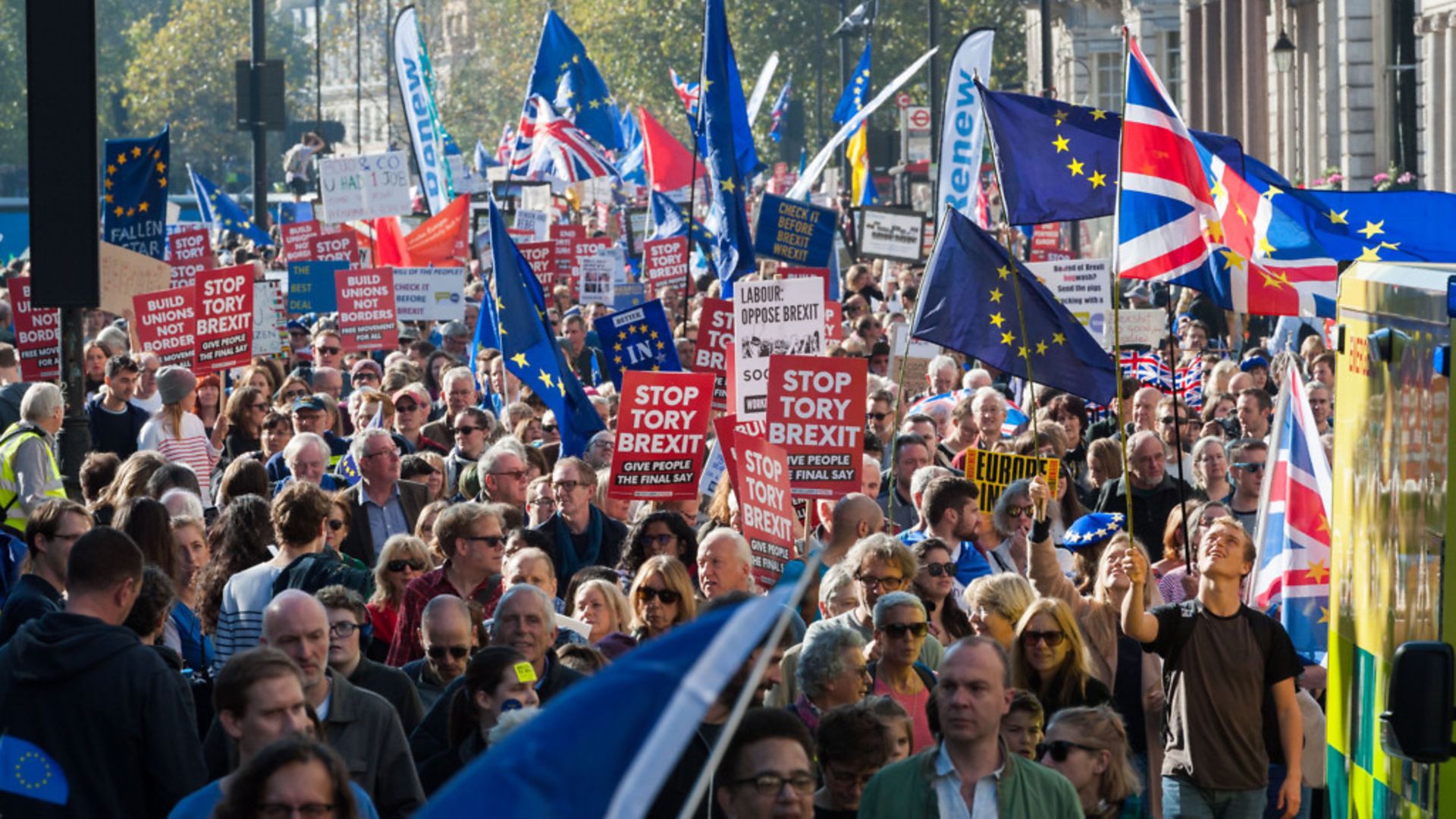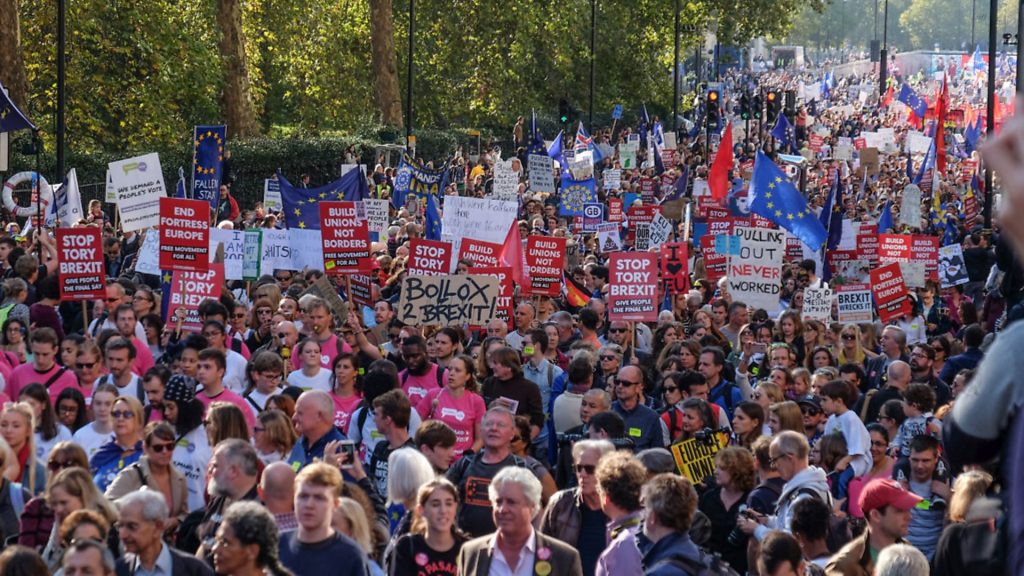
‘So what can a march like this actually achieve?’ asked TalkRadio presenter Alexis Conran, on the day plans for the ‘Put it to the People’ march were announced.

He was not asking out of cynicism, let alone out of the Brextremism of his fellow TalkRadio presenter Julia Hartley-Brewer, for whom any argument against the hardest Brexit imaginable is tantamount to treason. He was asking a genuine, and fair, question.
The honest answer, I said, is that it is impossible to know. How do you calculate the impact of a single day’s event in the sweep of a huge historic change like the UK’s departure – or not – from the European Union? You can’t. Not in any exact, scientific way. But name me a great campaign that didn’t have marching at its heart. Civil rights. Women’s rights. Gay rights. The anti-apartheid movement. The campaign to establish a National Health Service. The campaign for devolution. The campaign for a minimum wage. There have been marches for jobs, marches for justice, marches for just about anything worth fighting for, and it was good to see schoolchildren bunking off to do their own march to protest against the inaction of governments on the climate crisis. I hope they bring some of that youthful passion to the Put it to the People march on March 23, because though climate change might destroy the planet, Brexit is going to do an awful lot to destroy their opportunities while the world is still here.
A previous People’s Vote march was shown a wonderful video, narrated by the Scottish actor Brian Cox, a kind of compilation of marches down the years, which ended with a quote from perhaps the greatest campaigner of my lifetime, Nelson Mandela – ‘Everything is impossible, until we make it happen.’
We know that the anti-apartheid campaign was successful, in that the apartheid regime fell under domestic and international pressure, Mandela was released from prison and elected as president. Did marching do that? No. But it definitely helped.
Already, in the up and down story of the resistance to Brexit, and the demand that the outcome of the government’s negotiations be put back to the people for ratification, marches have played an important role. Don’t forget that when we first started to agitate, not least this newspaper – which came into being to give voice to the 48% who voted Remain – we were dismissed as eccentrics and fanatics, likened to those Second World War Japanese soldiers who could never admit the conflict was over.
Getting the mainstream media, or all but a handful of MPs, even to acknowledge that another referendum might be worth considering, given how far removed from the campaign promises an actual Brexit were turning out to be, was hard bordering on impossible. ‘Will of the people, will of the people, will of the people…’ But what if the will of the people changes? ‘It won’t. The people have spoken. Suck it up.’
It was a march in London, which drew a crowd of around 100,000 people, that led to a change in tone of the media coverage of the issue, and emboldened more MPs to get their heads above the parapet. Then, marches organised at last year’s party conferences helped to shape the agenda for those conferences, especially Labour’s.
Now it is true that Jeremy Corbyn and his coterie of advisers in particular remain resistant to the last part of the policy that was agreed at that conference, campaigning for a People’s Vote if their version of Brexit or a general election fail to materialise. But that it is there at all, and shadow chancellor John McDonnell and Brexit spokesman Keir Starmer among those determined to keep it there, and seemingly warming to it as an option, is at least in part down to the march and protests for it. And then there was the big one, last October, when not just tens of thousands but hundreds of thousands gathered in the capital to make their voices heard.
Theresa May’s dismissal of the campaign as ‘the politicians’ vote’ seemed odd in the extreme, set against the backdrop of so many people coming from all corners of the UK to gather outside parliament to protest that the politicians were not listening to them. From that day, our centrality to the debate was inarguable. EU leaders also took note, that the messages they were getting from both May and Corbyn, that there was no demand for another referendum, were not accurate.
If that was the extra-parliamentary high point of the campaign, the parliamentary highpoint was the massive defeat inflicted on May’s miserable deal by MPs in January. Yet since then, somewhat paradoxically but for a variety of reasons, we have undoubtedly lost altitude.
Partly, it’s just a question of time, the clock ticking its way to the March 29 cliff edge. Partly, it’s been the government framing of the choice, echoed by most of the media, as May’s deal or no-deal. Partly, useless though she may be in many ways, May’s use of the bully pulpit that comes with the job to demonise the People’s Vote as anti-democratic (how can a vote of the people be anti-democratic?) and liable to provoke social division and unrest (like none exists already) had some effect. Corbyn being equally opposed from the other side of the despatch box helped her. Cabinet ministers we kept hearing were going to resign kept finding reasons not to. Then a succession of parliamentary votes indicated that even if the Labour frontbench did whip MPs to support a People’s Vote, it might not be enough.
Campaigns are like sporting events. You have ups and downs. You have periods when you’re on top, and periods when you’re not. You have times when things go according to plan, times when they don’t. You have unexpected advances, and unexpected setbacks. You have star players who turn up and perform, others who don’t. You have squad players who emerge as stars. You also have the power of the crowd, some for you, some against.
It is partly as a response to the demands of the crowd that marches take place. The Put it to the People march will be attended by many who have been asking themselves, and asking others, not least people like me and other campaigners with a profile, ‘what can we do to help?’ That is the cry of the committed, and indeed the desperate, down the years. And it is a feeling felt most intensely at times like now when politics and the political process seem so weak and unable to adapt to the changing currents of public opinion. The march provides a part of the answer. It provides a focus for the many and varied campaign groups that have sprung up since June 2016.
Given it will cost a fair amount to stage, it might give those wealthy businesspeople constantly moaning about Brexit, and the damage it will do to their country and their businesses, the inspiration finally to get their chequebooks out and donate to the cause.
The big march last October was built over months. The Put it to the People march, because of that ticking clock, is being put together in a matter of weeks. Its success will depend less on which politicians speak from the platform, and what they say, then how many people come, how much passion they muster, how much noise they make.
It is deliberately timed between the European Council, when EU leaders are likely to try to help May with some cosmetic changes to assuage some of her MPs, and yet another crucial day in the Commons. And this time it really is crucial. So if you’re not up for marching just a few days before we are due to leave, when would you be?
Spread the word. Bring your friends. Bring your family. Don’t miss out on the chance, maybe the last chance, to make a difference. For all the talk of social unrest, I believe that if we win this fight, the country will ultimately rejoice. How, by contrast, will the country feel if May’s campaign of time-wasting and blackmailing succeeds, and we are out on March 29.
Rejoice? I somehow doubt that our streets or our hearts are going to fill with joy as her miserable deal miserably trickles over the line marked ‘national decline starts here’.
To sign up, visit http://www.peoples-vote.uk/march










